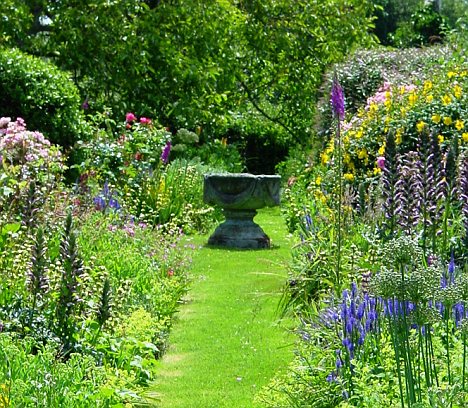Maintaining a beautiful garden all year round

Maintaining a beautiful garden all year round requires a lot of hard work and dedication. However, with the right techniques and strategies, you can keep your garden looking healthy and vibrant in every season.
Start with a Solid Foundation: Soil Preparation Tips The soil is the foundation of your garden, and preparing it correctly is essential for the long-term health of your plants. Start by testing your soil to determine its pH level and nutrient content. Based on the results, you can amend the soil with organic matter, such as compost or aged manure, to improve its quality. Make sure to till the soil thoroughly to ensure that the organic matter is evenly distributed. Additionally, consider adding a layer of mulch to protect the soil from erosion and to retain moisture.
Watering and Irrigation Tips for Every Season Watering your garden is crucial for its health and growth, but it’s important to do it correctly to avoid over- or under-watering. The amount and frequency of watering depend on several factors, such as the type of plant, soil type, and weather conditions. In general, it’s best to water deeply and infrequently to encourage deep root growth. During the growing season, aim to water your garden once or twice a week, depending on rainfall. In hot and dry conditions, you may need to water more frequently. Be sure to water in the morning or evening to avoid evaporation and to prevent fungal growth.
The Importance of Mulching and How to Do It Right Mulching is a simple yet essential technique for maintaining a healthy garden. Mulch is a layer of organic or inorganic material, such as wood chips, straw, or gravel, that is spread over the soil surface. Mulch helps to retain moisture, suppress weed growth, and regulate soil temperature. To mulch correctly, apply a layer of 2-3 inches of mulch around the base of your plants, making sure not to bury the stems. Make sure to keep the mulch away from the trunk or stem of the plant to prevent rotting.
Pruning and Trimming: When and How to Cut Your Plants Pruning and trimming are essential techniques for maintaining the shape, health, and growth of your plants. The timing and method of pruning and trimming depend on the type of plant, its growth habit, and the time of year. In general, it’s best to prune in the dormant season, when the plant is not actively growing, to avoid damaging new growth. Make sure to use sharp, clean tools and to make clean cuts to avoid tearing or crushing the plant tissue. Remember to prune selectively and to avoid over-pruning, which can weaken the plant.
Fertilizing Your Garden: What You Need to Know Fertilizing your garden is essential for providing the necessary nutrients for plant growth and health. There are several types of fertilizers available, such as organic and synthetic fertilizers. Organic fertilizers are derived from natural sources, such as compost or manure, while synthetic fertilizers are manufactured from chemicals. When fertilizing, it’s important to follow the manufacturer’s instructions and to avoid over-fertilizing, which can burn the plant roots. Additionally, consider using slow-release fertilizers to provide a steady supply of nutrients over time.
Dealing with Pests and Diseases: Prevention and Control Tips Pests and diseases are common problems that can affect the health and growth of your plants. Prevention and control techniques include several methods, such as planting resistant varieties, promoting healthy soil and plant growth, and using biological or chemical controls. It’s important to monitor your garden regularly for signs of pests or diseases and to take action quickly to prevent them from spreading. Consider using organic pest and disease control methods, such as companion planting, crop rotation, and neem oil, to minimize the use of chemicals.
Hire a professional Maintaining a beautiful and healthy garden takes time, effort, and knowledge. While gardening can be a relaxing and rewarding hobby, not everyone has the time, energy, or expertise to devote to it. Hiring a local poole gardener can provide many benefits, such as:
Expertise and knowledge: Professional gardeners have the knowledge, skills, and experience to design, plant, and maintain gardens of all sizes and types. They understand the specific needs of different plants and can provide advice on the best plants for your soil, climate, and garden style.
Time-saving: Maintaining a garden requires regular care and attention, which can be time-consuming. By hiring a professional gardener, you can free up your time for other activities and enjoy your garden without the stress and hassle of maintenance.
Cost-effective: While hiring a professional gardener may seem like an added expense, it can actually save you money in the long run. Professional gardeners have access to high-quality materials, tools, and plants, which can reduce the risk of costly mistakes and ensure the long-term health and beauty of your garden.
Increased property value: A well-designed and maintained garden can add significant value to your property and enhance its curb appeal. Professional gardeners can help you create a garden that complements your home’s style and improves its overall look and feel.
Health and safety: Gardening can be physically demanding and even hazardous, especially for older adults or those with physical limitations. By hiring a professional gardener, you can avoid the risk of injury and ensure the safety of your garden and property.
Personalized service: Professional gardeners can provide customized services that meet your specific needs and preferences. Whether you need regular maintenance, seasonal planting, or a complete garden makeover, a professional gardener can tailor their services to your requirements.
Conclusion By following these tips, you can maintain a beautiful garden all year round and enjoy the rewards of your hard work.




lfclc;fcc. hdydr